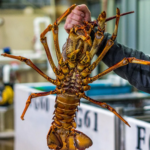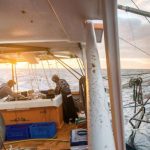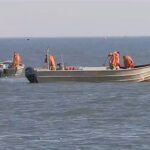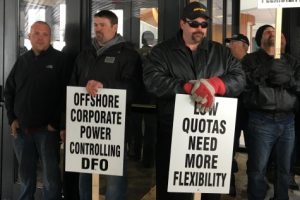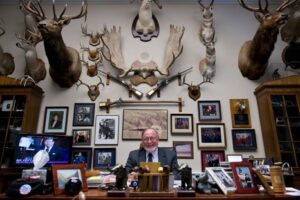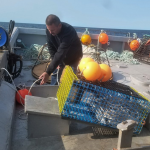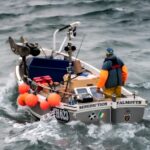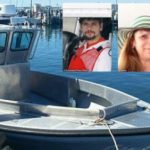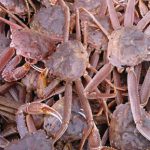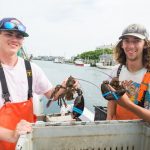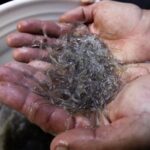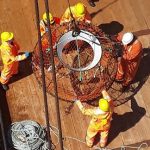Tag Archives: At Sea Observers
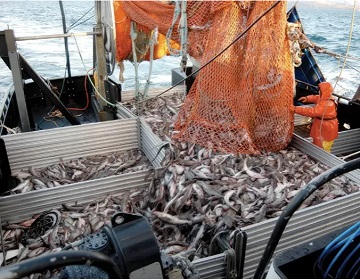
Solutions to the Bycatch Blame Game
The issue of bycatch has grown more important as some fisheries get smaller and those who depend on the fish for their livelihood or survival find that there are not enough fish to go around. This raises the question of whether bycatch is at the root of the problem or if other issues facing fisheries must be addressed. Bycatch is monitored in a combination of ways, through at-sea observers, electronic monitoring, seafood processing plant observers, logbooks, and fish tickets. “In the Bering Sea, approximately 94 percent of all catch is observed, including 99 percent of all trawl catch,” Bush explains. “In the Gulf of Alaska, 40 to 50 percent of all catch is observed across all gear types.” Photos, >click to read< 12:26
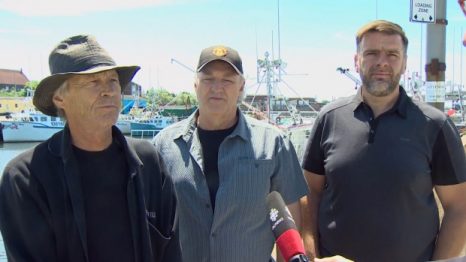
DFO plan for at-sea observers met with skepticism by lobster fishermen
A federal government proposal to introduce mandatory at-sea observers on board the southwest Nova Scotia lobster fleet is getting a cold shoulder from representatives of three fisheries groups.
The Department of Fisheries and Oceans wants observers to monitor bycatch of cod and cusk caught inadvertently in lobster traps. Bernie Berry of the Coldwater Lobster Association said the plan would require all fishermen to notify the government every time they plan to leave port — a process known as hailing out. Some would be randomly selected to have an observer from an existing monitoring company meet them at the dock prior to sailing. click here to read the story 11:37
Proposal For At Sea Observers Could Further Hurt U.S. Purse Seiner Fleet
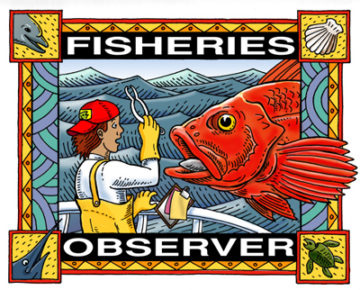 A new fishery rule that the federal government is moving to implement is expected to deal another financial blow to the US purse seiner fleet, which is already faced with stiff competition from foreign vessels such as the Chinese fleet, who are subsidized by their government, China. US National Marine Fishery Service (NMFS) has proposed a rule which would require Observers to be on board US purse seiners fishing in the western and central Pacific ocean (WCPO). The proposal was issued last week under authority of the Western and Central Pacific Fisheries Convention Implementation Act. It is a three-pronged proposed rule, which includes a move to establish restrictions in 2016 and 2017 on the use of fish aggregating devices (FADs) by U.S. purse seine vessels in the WCPO; and to establish limits in 2016 and 2017 on the amount of bigeye tuna that may be captured by U.S. longline vessels in the WCPO. Read the rest here 11:54
A new fishery rule that the federal government is moving to implement is expected to deal another financial blow to the US purse seiner fleet, which is already faced with stiff competition from foreign vessels such as the Chinese fleet, who are subsidized by their government, China. US National Marine Fishery Service (NMFS) has proposed a rule which would require Observers to be on board US purse seiners fishing in the western and central Pacific ocean (WCPO). The proposal was issued last week under authority of the Western and Central Pacific Fisheries Convention Implementation Act. It is a three-pronged proposed rule, which includes a move to establish restrictions in 2016 and 2017 on the use of fish aggregating devices (FADs) by U.S. purse seine vessels in the WCPO; and to establish limits in 2016 and 2017 on the amount of bigeye tuna that may be captured by U.S. longline vessels in the WCPO. Read the rest here 11:54
New England: Fishermen say new cost will sink industry
 Local ground fishermen will be forced by the government to pay for their own compliance monitoring as of March 1, a cost some say will destroy the fishing industry. Fishermen will need to pay for at-sea monitors to observe their compliance with federal regulations starting Tuesday, according to the National Oceanic and Administrative Administration, which regulates the country’s fisheries. Monitors are required to join fishermen on 24 percent of their fishing days, and fishermen will have to pay on 20 percent of their fishing days. Each of those days is expected to cost approximately $700, industry members have estimated. Read the rest here 08:56
Local ground fishermen will be forced by the government to pay for their own compliance monitoring as of March 1, a cost some say will destroy the fishing industry. Fishermen will need to pay for at-sea monitors to observe their compliance with federal regulations starting Tuesday, according to the National Oceanic and Administrative Administration, which regulates the country’s fisheries. Monitors are required to join fishermen on 24 percent of their fishing days, and fishermen will have to pay on 20 percent of their fishing days. Each of those days is expected to cost approximately $700, industry members have estimated. Read the rest here 08:56
Moving Forward: Fishermen await trial on NOAA monitors mandate
 Local fisherman David Goethel said he hopes a court ruling comes soon to determine the legality of a new federal mandate, as he and other fishermen are fearful they will go under before the trial begins. Goethel said he may sell his fishing boat after this summer if the trial isn’t resolved by then. He filed the lawsuit causing the trial, challenging the National Oceanic and Atmospheric Administration’s plan to make fishermen pay for their own policing. He filed it in conjunction with a fishing sector based in Massachusetts. While Goethel said he might personally consider retirement this year, he still feels strongly about going forward with the trial to prevent a new precedent for the fishing industry. Read the article here 10:48
Local fisherman David Goethel said he hopes a court ruling comes soon to determine the legality of a new federal mandate, as he and other fishermen are fearful they will go under before the trial begins. Goethel said he may sell his fishing boat after this summer if the trial isn’t resolved by then. He filed the lawsuit causing the trial, challenging the National Oceanic and Atmospheric Administration’s plan to make fishermen pay for their own policing. He filed it in conjunction with a fishing sector based in Massachusetts. While Goethel said he might personally consider retirement this year, he still feels strongly about going forward with the trial to prevent a new precedent for the fishing industry. Read the article here 10:48
Fishermen file lawsuit in N.H. against NOAA over at sea observers
A group of fishermen in the region filed a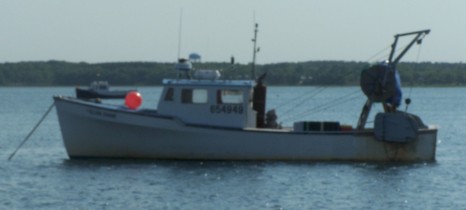 Wednesday against the National Oceanic and Atmospheric Administration in federal district court in Concord, N.H., arguing that the agency violated their rights by forcing them to pay for a controversial program that requires government-trained monitors on their vessels to observe their catch. The fishermen, who in the coming weeks will be required to pay hundreds of dollars every time an observer accompanies them to sea, argue that the costs are too much to bear and will put many of them out of business. The lawsuit alleges that, by forcing fishermen to pay for the monitors, regulators have violated their Constitutional rights and that their actions are “arbitrary, capricious, and an abuse of discretion.” Read the article here 19:13
Wednesday against the National Oceanic and Atmospheric Administration in federal district court in Concord, N.H., arguing that the agency violated their rights by forcing them to pay for a controversial program that requires government-trained monitors on their vessels to observe their catch. The fishermen, who in the coming weeks will be required to pay hundreds of dollars every time an observer accompanies them to sea, argue that the costs are too much to bear and will put many of them out of business. The lawsuit alleges that, by forcing fishermen to pay for the monitors, regulators have violated their Constitutional rights and that their actions are “arbitrary, capricious, and an abuse of discretion.” Read the article here 19:13
NOAA adds Insult to Injury with Observer Coverage – Governor Baker will push for Industry Inclusion in Assessments
 With a crystalline portrait of America’s oldest seaport serving as the backdrop, Gov. Charlie Baker on Thursday attacked NOAA’s plan to force fishermen to pay for at-sea observers on their boats and reiterated his pledge to help convince the federal fishing regulator to consider science other than its own. “Under the federal rules, there’s currently one source of truth and that source of truth is designed and delivered by NOAA,” Baker said. “NOAA operates under a standard that’s called ‘best available information’ and at this point in time the only best available information is theirs.” Read the rest here 20:57
With a crystalline portrait of America’s oldest seaport serving as the backdrop, Gov. Charlie Baker on Thursday attacked NOAA’s plan to force fishermen to pay for at-sea observers on their boats and reiterated his pledge to help convince the federal fishing regulator to consider science other than its own. “Under the federal rules, there’s currently one source of truth and that source of truth is designed and delivered by NOAA,” Baker said. “NOAA operates under a standard that’s called ‘best available information’ and at this point in time the only best available information is theirs.” Read the rest here 20:57
Electronic Monitoring versus At Sea Observers – Technology buoys fishermen devastated by cod’s collapse
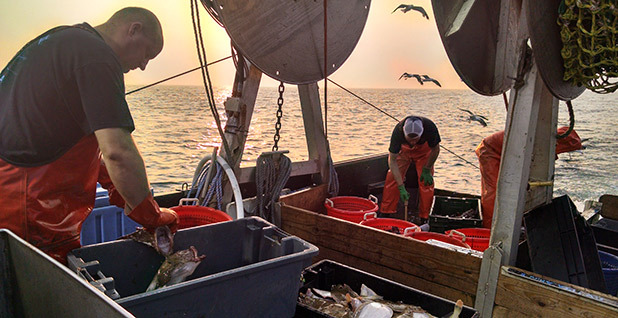 By the end of this year, NMFS wants groundfish fishermen to pay for their own “at-sea monitors,” the independent observers who collect data on bycatch and ensure fishermen follow the rules..”It’s the people that we’re dealing with that we trust,” said . “I know that John is trying to do the best he can, and I know the people he’s got working for him are trying to do the best they can.” As for the rest of NOAA? “Would you trust someone who has screwed you nonstop your whole life?” he said. “Thirty-five years ago, I thought it was different. I don’t anymore.” Read the rest here 12:09
By the end of this year, NMFS wants groundfish fishermen to pay for their own “at-sea monitors,” the independent observers who collect data on bycatch and ensure fishermen follow the rules..”It’s the people that we’re dealing with that we trust,” said . “I know that John is trying to do the best he can, and I know the people he’s got working for him are trying to do the best they can.” As for the rest of NOAA? “Would you trust someone who has screwed you nonstop your whole life?” he said. “Thirty-five years ago, I thought it was different. I don’t anymore.” Read the rest here 12:09

































